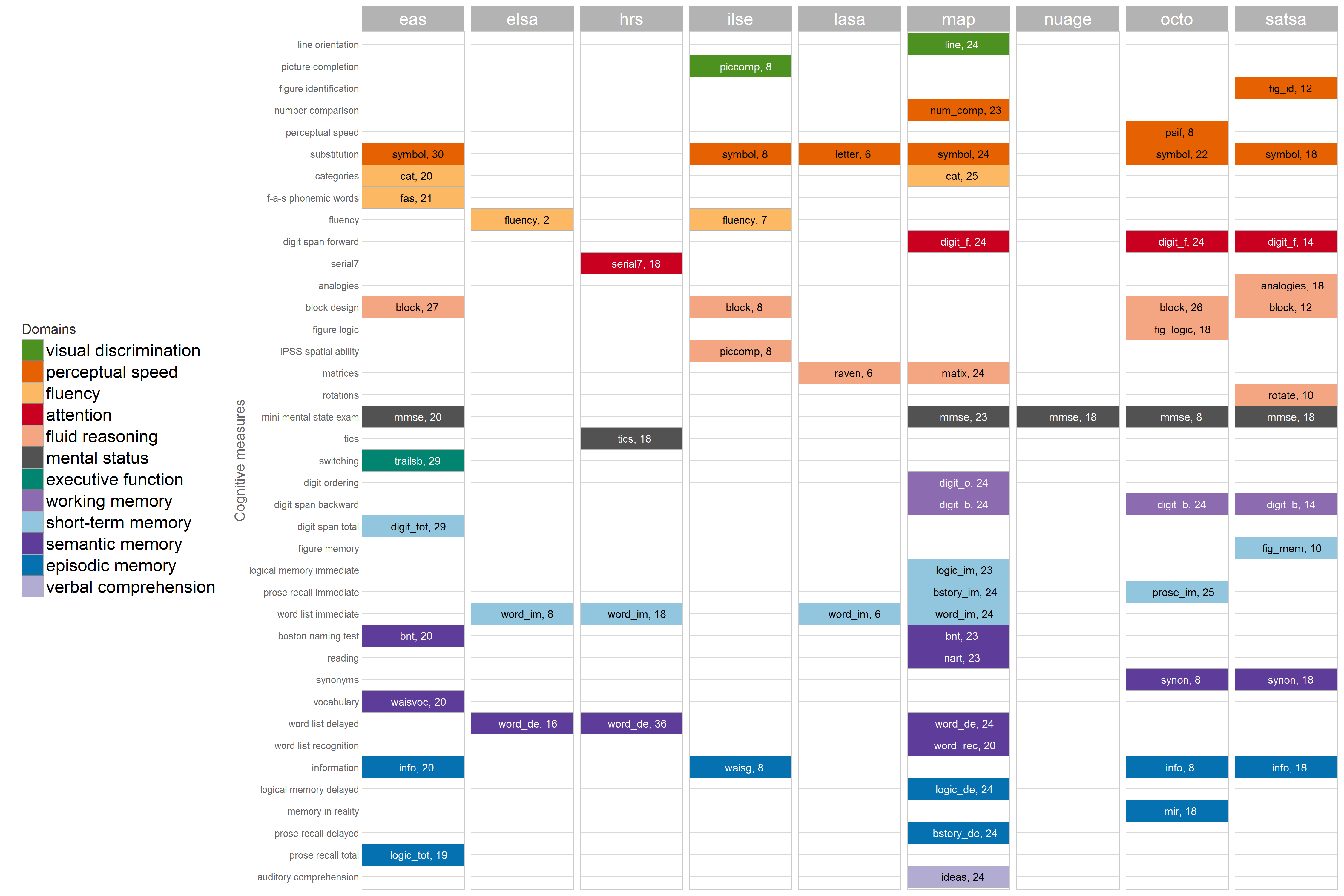 Quick links: news - projects - tools - log - participants - dashboard - GSA poster
Quick links: news - projects - tools - log - participants - dashboard - GSA poster
#Concurrent decline of body and mind
IALSA-2015-Portland workshop performs a coordinated analysis with replication (CAR) of decline in physical and cognitive functioning during later adulthood. The research agenda distinguishes the following foci:
gait-cognitive- Associations between changes in measures of gait and changes in cognitive function.grip-cognitive- Associations between changes in grip function and changes in cognitive function.pulmonary-cognitive- Associations between changes in pulmonary function and changes in cognitive function.physical-cognitive- Associations between physical and cognitive decline.physical-physical- Associations among rates of change in measures of physical functioning.cognitive-cognitive- Associations among rates of change in measures of cognitive function.
The following information display shows the available statistical models in the collective, grouping them by cognitive domains (color), items tapping those domains (row labels), and specific tests (cell labels) and indicating the total number of models using this item (number after cell label).
Any model in the collective can be specified by a form nested within the general specification:

The covariance structure will be given as

For details see model specification.
Analytic tools available to the workshop participants include dynamic reports and interactive apps. Both reports and apps are regenerated with each new influx of model submissions.
- Rename and collapse gives account of how model filename elements (subgroup, model_type, cognitive_measure, etc.) are corrected, renamed, and reclassified. Incorporates the results of Teleconference 1 on Jun 12.
- Model Counts and Model Essentials give basic tabled view of data in model space.
- Current status update for each study: EAS, ELSA, HABC, ILSE, NAS , NuAge, OCTO-Twin, RADC, SATSA
- model_space graphing how the measures are mapped into domains. We need to understand how best to organize our models for the analysis, in which model (not individual) is the primary unit .
- reproduce script that re-generates all these reports.
- scripts README overview scripts that replicates data preparation
- dashboard
- pivot tables for basic exploration in the space of the submitted models
| Study | Contact |
|---|---|
| EAS | measures |
| ELSA | Annie Robitaille |
| HABC | Chenkai Wu |
| ILSE | Philipp Handschuh |
| NAS | Lewina Lee |
| NuAge | Valerie Jarry |
| OCTO-Twin | Marcus Praetorius |
| RADC | Cassandra Brown |
| SATSA | Deborah Finkel |
The current repository analyzes the results of the IALSA Analysis Workshop (pdf overview) that was held in Portland, Oregon from Monday February 23rd (8:30am) to Wednesday February 25th (12:30pm), 2015.
The primary aim of the workshop was to examine associations between changes in physical functioning (i.e., grip strength, pulmonary function, chair stands, walking speed) and cognitive functioning (i.e., measures of speed, memory, reasoning, executive functioning) in multiple-study comparative framework. Bivariate growth processes were estimated to evaluate dynamic associations in change and variation within and across these domains and in relation to sample and individual differences in age, lifestyle, and health outcomes. The results from these analyses will extend recent systematic reviews and meta-analyses (e.g., Clouston et al., 2012, Epidemiological Reviews and will be submitted for publication as a set of independent brief reports, capped by a literature review/overview of analysis and completed with a research synthesis summary.
See projects page for a detailed overview of the projects planned before the Portland conference.
At the time a project shapes up it gets its own repository, which will eventually host the publication manuscript and all contingencies for reproducibility. Currently, the following repos are gearing toward producing manuscript for submission:
- Portland-physical-cognitive repo follow the physical-cognitive track, evaluating the longitudinal models in which physical and cognitive outcomes form a bivariate linear structure.
- GSA poster presenting developments in the physical-cognitive track
- Scatters of Factor Scores: graphs explained in the issue #100
- Reminder has been sent to those who did not yet provided Table 1, measure descriptions, or PxP models.
- Description of measures have been added. Still many missing item documentations.
- Announcing Physical Track
- A Collaborative Modeling Framework for Multi-Study Coordinated Analyses, Wellcome Trust Conference, July 22, 2015
The agenda and outcomes of each teleconference following the Portland workshop
- Announcing Physical Track
- Teleconference #3, 10-July-2015
- Teleconference #2, 26-June-2015
- Teleconference #1, 12-June-2015
Quick links: news - projects - tools - log - participants - dashboard
